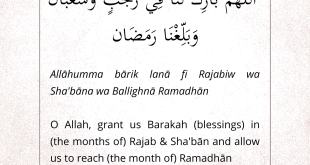 1. If one’s elders are engaged in some ibaadat or work and one wishes to speak to them or discuss some matter with them, one should wait for them to complete whatever they are engaged in. When waiting for them, one should wait at a slight distance so that they are not disturbed by one’s presence. Thereafter, when they complete their ibaadat or work, one may meet them and discuss one’s need with them. In this manner, one will not disrupt their programme nor inconvenience them.
1. If one’s elders are engaged in some ibaadat or work and one wishes to speak to them or discuss some matter with them, one should wait for them to complete whatever they are engaged in. When waiting for them, one should wait at a slight distance so that they are not disturbed by one’s presence. Thereafter, when they complete their ibaadat or work, one may meet them and discuss one’s need with them. In this manner, one will not disrupt their programme nor inconvenience them.
عن أنس ومالك بن أوس بن الحدثان رضي الله عنهما أن النبي صلى الله عليه وسلم خرج يتبرز فلم يجد أحدا يتبعه، فخرج عمر فاتبعه بفخارة أو مطهرة، فوجده ساجدا في مسرب، فتنحى فجلس وراءه، حتى رفع النبي صلى الله عليه وسلم رأسه فقال: أحسنت يا عمر حين وجدتني ساجدا فتنحيت عني، إن جبريل جاءني فقال: من صلى عليك واحدة صلى الله عليه عشرا، ورفع له عشر درجات (الأدب المفرد رقم 642)
Hazrat Anas and Maalik bin Aus (Radhiyallahu Anhuma) report that on one occasion, Rasulullah (sallallahu alaihi wasallam) went out to relieve himself and there was no one present to accompany him (to assist him to make wudhu after relieving himself). Hazrat Umar (Radhiyallahu Anhu) then came out and followed Rasulullah (sallallahu alaihi wasallam) with a utensil (of water). (When he reached Rasulullah (sallallahu alaihi wasallam)), he found Rasulullah (sallallahu alaihi wasallam) present by a small pond in the state of sajdah. Hazrat Umar (Radhiyallahu Anhu) then moved away and sat behind Rasulullah (sallallahu alaihi wasallam). He remained waiting for Rasulullah (sallallahu alaihi wasallam) until Rasulullah (sallallahu alaihi wasallam) lifted his Mubaarak head from sajdah. Rasulullah (sallallahu alaihi wasallam) then mentioned to him, “O Umar, you conducted excellently. You moved away and waited for me when you found me in the state of sajdah. (I had prostrated before Allah Ta’ala out of gratitude because) Hazrat Jibreel (alaihis salaam) had come to me and said, ‘The one who recites durood upon you once, Allah Ta’ala will send ten mercies upon him and raise him by ten stages.’”
 Wifāq ul Ulāma (SA) ASSOCIATION OF SOUTH AFRICAN 'ULAMA
Wifāq ul Ulāma (SA) ASSOCIATION OF SOUTH AFRICAN 'ULAMA
